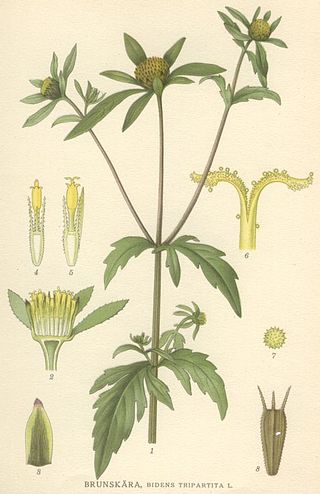
Bidens is a genus of flowering plants in the aster family, Asteraceae. The genus include roughly 230 species which are distributed worldwide. Despite their global distribution, the systematics and taxonomy of the genus has been described as complicated and unorganized. The common names beggarticks, black jack, burr marigolds, cobbler's pegs, Spanish needles, stickseeds, tickseeds and tickseed sunflowers refer to the fruits of the plants, most of which are bristly and barbed. The generic name refers to the same character; Bidens comes from the Latin bis ("two") and dens ("tooth").

Arnica is a genus of perennial, herbaceous plants in the sunflower family (Asteraceae). The genus name Arnica may be derived from the Greek arni, "lamb", in reference to the plants' soft, hairy leaves. Arnica is also known by the names mountain tobacco and confusingly, leopard's bane and wolfsbane—two names that it shares with the entirely unrelated genus Aconitum.

Heterotheca is a genus of North American plants in the family Asteraceae.
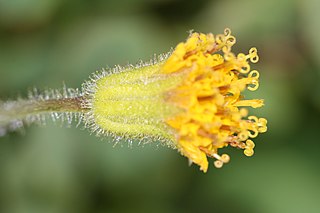
Arnica parryi is a North American species of flowering plant known by the common names Parry's arnica or nodding arnica. It is native to western Canada and the western United States as far south as Inyo County, California and McKinley County, New Mexico. It grows in temperate coniferous forests and alpine meadows in mountainous areas, primarily the Rocky Mountains, Cascades, and Sierra Nevada.
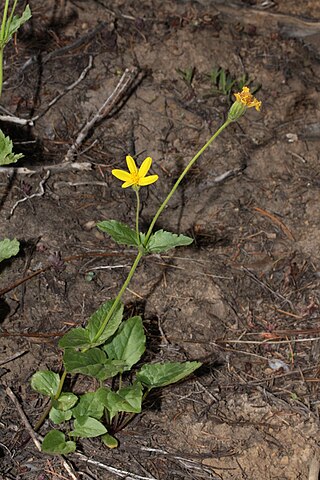
Arnica latifolia is a species of arnica in the sunflower family, known by the common names broadleaf arnica, broad leaved arnica, mountain arnica, and daffodil leopardbane. It is native to western North America from Alaska east to Northwest Territories and south to Mono County, California, and Taos County, New Mexico. It grows in mountain habitat such as forest and meadows.

Arnica nevadensis is a North American species of arnica in the sunflower family, known by the common names Nevada arnica and Sierra arnica. It is native to the coniferous forests of the western United States, primarily the Cascades and Sierra Nevada.

Arnica sororia is a North American species of flowering plant known by the common name twin arnica. It is native to Western Canada and the Western United States. It grows in grasslands and in conifer forests, as well as the sagebrush steppe.
Arnica spathulata is a rare North American species of flowering plant in the family Asteraceae, known by the common name Klamath arnica. It is native to the Klamath Mountains of northwestern California and southwestern Oregon. It grows in woodland habitat, almost exclusively on serpentine soils.
Arnica viscosa is an uncommon North American species of flowering plant in the family Asteraceae, known by the common name Mount Shasta arnica.

Madieae is a tribe of flowering plants in the family Asteraceae. It is sometimes considered a subtribe of Heliantheae. Notable species include the tarweeds of the Western United States as well as the silverswords of Hawaii.

Arnica dealbata is a species of Californian plants in the tarweed tribe within the aster family

Arnica unalaschcensis is an Asian and North American species of flowering plant in the family Asteraceae, known as Alaskan arnica. It is found on both sides of the Bering Strait, being native to Alaska, the Pacific Coast of Russia, and northern Japan. Its habitats include coastal tundra and alpine slopes.
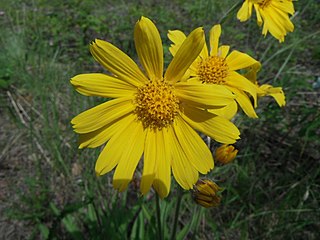
Arnica lonchophylla is a species of flowering plant in family Asteraceae. The common names for this species includes longleaf arnica, northern arnica, and spear-leaved arnica. It has daisy-like yellow flowers that are 2.5 to 5 cm across with a yellow center disks.

Arnica angustifolia is an Arctic and alpine species of plants in the sunflower family, known by the common names narrowleaf arnica and Arctic arnica. It is native to colder regions in Europe, Asia, and North America (northern and western Canada, Alaska, northern Rocky Mountains.

Arnica griscomii is an Asian and North American species of plants in the sunflower family, known by the common name snow arnica. It is native to eastern Russia and northwestern North America and to eastern Canada.
Arnica sachalinensis is an Asian species of flowering plant in the family Asteraceae. It is native to Sakhalin Island on the Pacific Coast of Russia.

Arnica ovata is a North American species of flowering plant in the family Asteraceae, known by the common name sticky leaf arnica. It is native to western Canada, and the western United States.
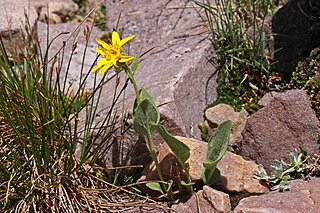
Arnica rydbergii is a North American species of flowering plant in the family Asteraceae, known by the common name Rydberg's arnica or subalpine arnica or subalpine leopardbane. It is native to western Canada, and the western United States.















